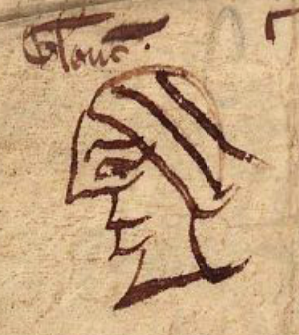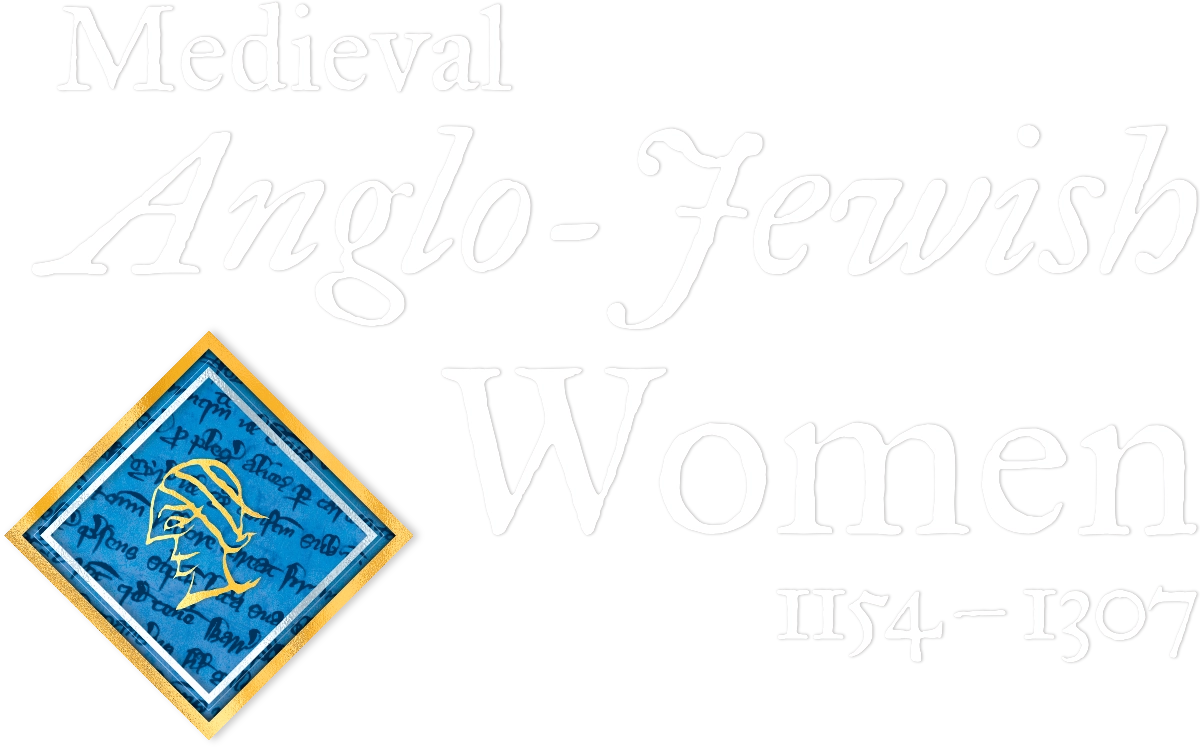Mirabel of Gloucester
Referred to in records as: “Mirabel”, “Mirabil”, “Mirabil de Gloucʼ”, “Mirabil of Gloucester”, “Mirabilem de Gloucʼ”, “Mirabili”, “Mirabilia”, “Mirabilia de Glouernia”, “Mirabilis”, “Mirabilus”, “Mirable”, “Mirable de Glouc’”.
Brief biography

Mirabel of Gloucester was matriarch of the Gloucester Jewish community in the early
thirteenth century. A January 1218 doodle of her, in the margins of the fine roll
for
the second year of King Henry III’s reign, is the the earliest image of a non-biblical
Jewish woman known in England: next to an entry confirming King John’s earlier acquittal
of her deceased husband Elias’s debts, and tucked just
under the county label Glouc’, a scribe sketched a rough
likeness—with a mighty side-eye. In this 1218 record, Mirabel also confirmed her rights
to
the Gloucester houses of her late husband. Elias was dead by the time Henry III took
the throne in October 1216, and the record is the result of her initiative: she had
gone in person to ask William Marshal, regent to the young Henry III, to return her
husband’s
properties to her. In 1220, she and her family were involved in the investigation
of the
death of Solomon Turbe, the husband of Comitissa, Mirabel’s son-in-law Isaac (husband of her daughter Belina) and her son Bonenfant were summoned as part of
Comitissa’s prosecution. Isaac was first charged with the murder by the Gloucester
sheriff, and Mirabel was instrumental in clearing his name.
Mirabel’s husband Elias was a top financier and property owner in
Gloucestershire. After his death, Mirabel continued the family businesses independently
and was among the top taxpayers of the community throughout the 1220s and 1230s. Mirabel’s
children,
Belina and Bonenfant were part of the
consortium, both marrying into families that created strong ties with the Worcester
and Hereford Jewish communities. Mirabel had the opportunity to work with
multiple generations of women in her family, and she maintained influence with the
Crown
throughout her life. In 1231, for instance, Henry III ordered the adjournment of an
investigation into land held by Mirabel: the land concerned the abbot of Gloucester
Abbey, and the man that Mirabel vouched to warranty (Walter de Muscgros, a
Gloucestershire land baron) was away on the king’s business in Wales. By 1235, her
daughter Belina and granddaughter Pucelle were
collecting rent in Gloucester for her, and Pucelle (daughter of Belina) worked as a creditor with her grandmother. Mirabel
died sometime between 1239 and 1250, when bonds in her name were granted to Jacob l’Eveske.
Further reading
- Williams Boyarin, Adrienne, The Christian Jew and the Unmarked Jewess: The Polemics of Sameness in Medieval English Anti-Judaism. The Middle Ages Series. University of Pennsylvania Press. 2021, pp. 131–33.
- Hillaby Joe, Testimony from the Margin: The Gloucester Jewry and Its Neighbours, c.1159–1290, Jewish Historical Studies 37 (2001): 41–112, especially 64–73.
- Hillaby, J. and C. Hillaby, The Palgrave Dictionary of Medieval Anglo-Jewish History. London: Palgrave. 2015, s.v. Gloucester, pp. 147–151.
Dates mentioned in records
1218–1250
Locations
Gloucestershire, Oxfordshire, Berkshire
Relatives
- Belina of Gloucester daughter of Mirabel (daughter)
- Bonenfant of Gloucester husband of Genta (son)
- Isaac son-in-law of Mirabel of Gloucester (son-in-law)
- Elias of Gloucester husband of Mirabel (husband)
- Pucelle of Gloucester daughter of Belina (granddaughter)
Records
- 1218, Gloucestershire: Inheritance/Estate
- 1220, Gloucestershire ¶
- 1220, Gloucestershire: Murder
- 1220, Gloucestershire ¶
- 1221: Donum/Tallage
- 1231, Gloucestershire: Property
- 1233: Donum/Tallage
- 1235, Gloucestershire: Property
- 1235, Oxfordshire: Debt
- 1250, Berkshire: Audit of chest
¶ Mirabel of Gloucester is mentioned solely as the relation of another person; she is
not present or involved in any business.

